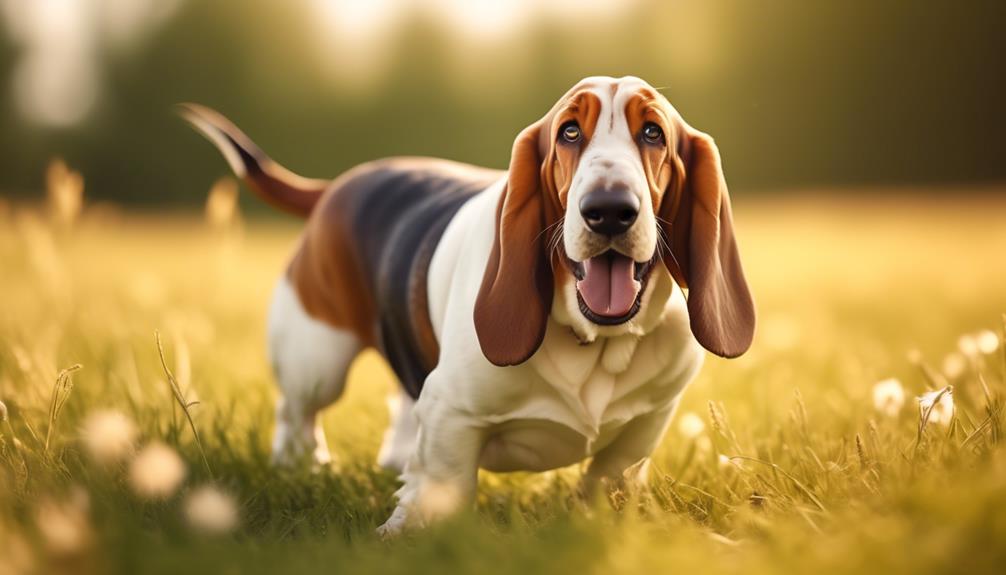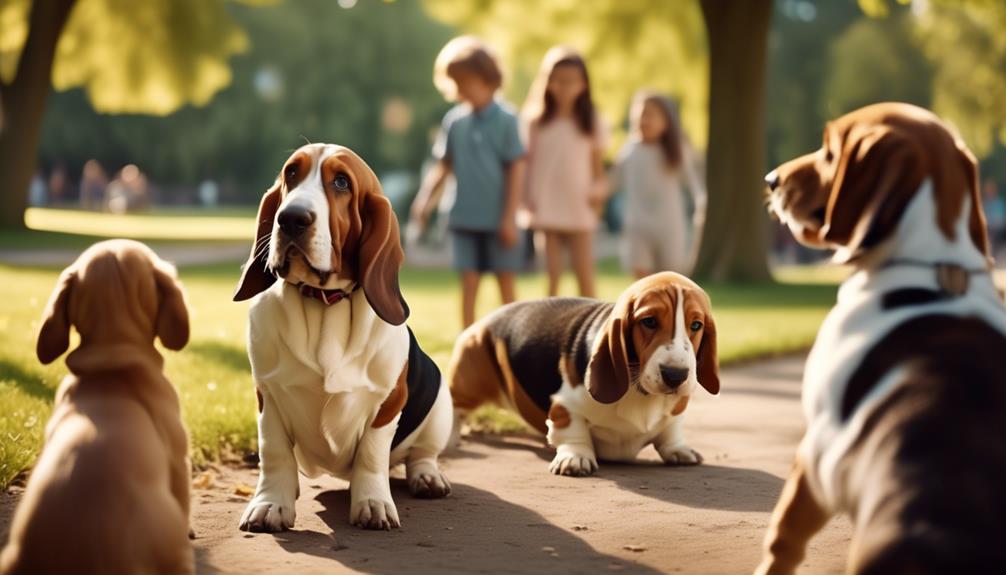Are you tired of coming home to a chaotic household?
Picture this: you walk through the door, and instead of chaos, you are greeted by a calm and loving presence.
Your children are laughing and playing with the perfect family dog, a Basset Retriever named Max.
Max has brought a sense of harmony and joy to your family, and you can't imagine life without him.
But what makes Basset Retrievers the perfect family dog?
Well, let's take a closer look at their unique qualities and find out why they are adored by families everywhere.
Key Takeaways
- Basset Retrievers are a great choice for apartment living as they can adapt well to smaller spaces.
- When choosing a Basset Retriever, consider their energy level and space requirements, as well as their ability to display polite behavior towards other residents.
- Basset Retrievers are usually good with kids, but supervision is necessary during playtime. They may also have a hunting instinct and may chase after cats and small animals, so boundaries should be set early on.
- Basset Retrievers require regular exercise, around an hour a day, and special attention should be given to their folded-over ears to prevent infection or dirt buildup.
History and Origins
The history and origins of Basset Retrievers can be traced back to their parent breeds, the Basset Hound and the Golden Retriever. Basset Retrievers are a newer designer breed that originated in France.
The Golden Retriever, originally a hunting dog, is now one of the most popular breeds in the US. The Basset Hound, also a hunting dog, is recommended as a companion.
Basset Retrievers have a mix of their parent breeds' personalities. They're usually great family dogs, forming loving and playful bonds with adults and children. Early socialization is important for their development. They're smart and need mental stimulation through toys and training.
Exercise is crucial, and while they can adapt to smaller living spaces, outdoor access is necessary.
Size and Appearance

After exploring the history and origins of Basset Retrievers, let's now turn our attention to their size and appearance.
Basset Retrievers are medium-sized dogs, with variations in size due to being a newer breed. Most weigh between 40 to 70 pounds and stand at a height of ten to 14 inches. They've a sturdy build with a muscular body.
Their coat can be short or long, depending on the dominant parent breed, and the main coat colors are black, chocolate, golden, and white. Their droopy ears and expressive eyes give them a charming and lovable appearance.
With their adorable and compact physique, Basset Retrievers make for the perfect family dog.
Personality and Temperament

When considering the personality and temperament of Basset Retrievers, it's important to note their unique blend of traits from their Basset Hound and Golden Retriever parents. Basset Retrievers are usually great family dogs, forming loving and playful bonds with adults and children. They are known for their affectionate nature and their ability to sense and offer comfort to their owners. Their intelligence requires mental stimulation through toys and training. While they can adapt to smaller living spaces, they still require around an hour of exercise every day. To give you a clearer understanding of their personality and temperament, here's a table highlighting their key traits:
| Personality Traits | Temperament |
|---|---|
| Affectionate | Playful |
| Intelligent | Loyal |
| Sensible | Energetic |
Health Considerations

To ensure the well-being of your Basset Retriever, it's important to consider their health needs and potential health concerns. Here are some key health considerations for your Basset Retriever:
- Regular Veterinary Checkups: Schedule regular wellness visits with a vet to monitor your Basset Retriever's overall health and detect any potential issues early on.
- Eye Issues: Basset Retrievers may be prone to eye problems, such as glaucoma or cataracts. Regular eye examinations by a veterinarian are essential to catch and treat these conditions.
- Elbow Dysplasia: Like their Basset Hound and Golden Retriever parents, Basset Retrievers can be at risk for elbow dysplasia. This is a developmental condition that affects the elbow joint and can cause pain and lameness. Regular exercise, weight management, and joint supplements may help reduce the risk.
Care and Maintenance

Moving on to the care and maintenance of your Basset Retriever, it's important to address their specific needs to ensure their overall well-being.
When it comes to grooming, Basset Retrievers require regular brushing of their coat once a week. They aren't heavy shedders, which makes maintenance easier. However, special attention should be given to their folded-over ears to prevent infection or dirt buildup.
Regular veterinary checkups are necessary to detect any health concerns early on. Basset Retrievers need around an hour of exercise every day to keep them active and energetic. Mental stimulation through toys and training is also essential for their well-being.
Providing them with a balanced diet formulated for medium-sized dogs with high energy is important to prevent weight gain and associated health problems.
With proper care and attention, your Basset Retriever will thrive and be a happy member of your family.
Feeding and Nutrition

To ensure the proper nourishment and well-being of your Basset Retriever, it's important to understand their feeding and nutritional needs. Here are some key points to keep in mind:
- Choose a high-quality dog food that's specifically formulated for medium-sized, high-energy dogs like Basset Retrievers.
- Feed your Basset Retriever according to their age, weight, and activity level. Puppies may require more frequent meals, while adults can be fed twice a day.
- Monitor your dog's weight and adjust their portion sizes accordingly to prevent overeating and weight gain.
- Provide fresh water at all times and ensure your Basset Retriever stays hydrated, especially during exercise.
- Avoid feeding your dog table scraps or human food, as it can lead to digestive issues and weight problems.
- Consult with your veterinarian for specific feeding recommendations and to address any dietary concerns or allergies your Basset Retriever may have.
Coat Color and Grooming

Basset Retrievers come in a variety of coat colors, including black, chocolate, golden, and white. The coat can be short or long, depending on the dominant parent breed. Thankfully, they aren't heavy shedders, so you won't have to constantly clean up fur. Brushing their coat once a week is sufficient to keep it looking neat and healthy.
When it comes to grooming, special attention should be given to their folded-over ears. Regular cleaning is necessary to prevent infection or dirt buildup. As for their overall grooming needs, Basset Retrievers are relatively low-maintenance.
They're adaptable to most climates, but in extreme temperatures, it's important to provide them with proper protection.
Compatibility With Children and Other Pets

When considering the compatibility of Basset Retrievers with children and other pets, it's important to assess their socialization and playful nature. Here are some key points to consider:
- Basset Retrievers are usually great with kids, forming loving and playful bonds. However, supervision is necessary during playtime to ensure the safety of both the dog and the child.
- Their hunting instincts may cause them to chase after cats and other small animals, so boundaries must be set early on to prevent any conflicts.
- Basset Retrievers have a playful nature, which may make them compatible with other dogs as well. However, proper introductions and boundaries should be set to ensure harmonious interactions.
Final Thoughts and Recommendations

In conclusion, it's important to consider the unique needs and characteristics of Basset Retrievers when making a decision about bringing one into your family. Basset Retrievers are generally great family dogs, forming loving and playful bonds with adults and children. However, supervision is necessary during playtime with kids, as their hunting instincts may cause them to chase after cats and other small animals.
Early socialization is crucial for their development, and they require mental stimulation through toys and training. Exercise is also important, with around an hour of exercise needed every day. While they can adapt to smaller living spaces, outdoor access is necessary.
Regular veterinary checkups and care, including attention to their folded-over ears, are necessary for their overall health and well-being. By considering these factors, you can determine if a Basset Retriever is the perfect addition to your family.
Frequently Asked Questions
Are Basset Retrievers Hypoallergenic?
No, Basset Retrievers are not hypoallergenic. They have a short or long coat that requires weekly brushing. If you have allergies, it's important to spend time with the dog to see how it affects you.
How Much Do Basset Retrievers Typically Cost?
Basset Retrievers typically cost anywhere from $500 to $1500, depending on factors like breeder reputation, location, and the dog's pedigree. It's important to research and find a reputable breeder to ensure the health and quality of the puppy.
Can Basset Retrievers Be Left Alone for Long Periods of Time?
Can Basset Retrievers be left alone for long periods of time? It is not recommended to leave them alone for extended periods as they thrive on companionship. They may develop separation anxiety and exhibit destructive behaviors when left alone for too long.
Do Basset Retrievers Require Any Specialized Training?
Basset Retrievers require some specialized training to ensure they are well-behaved and obedient. Consistent and positive reinforcement methods, along with early socialization, will help them develop into well-rounded and well-mannered family dogs.
Are Basset Retrievers Prone to Barking?
Basset Retrievers are not prone to excessive barking, but like any dog, they may bark to communicate or alert you. Proper training and socialization can help manage their barking behavior effectively.
Are Basset Retrievers and Basset Hounds Similar in Temperament and Family Suitability?
When it comes to temperament, Basset Retrievers and Basset Hounds share similar traits. Both breeds are known for their gentle and friendly nature, making them great family pets. However, there are some basset hound secrets revealed that highlight their stubborn streak, which may require patience and consistent training.
Conclusion
So there you have it, the Basset Retriever is the perfect family dog. With their loving nature and playful personality, they bring endless joy to any household.
Their medium size and intelligence make them a great fit for families of all ages. And with their minimal grooming needs and generally good health, they require little maintenance.
So why wait? Bring a Basset Retriever into your home today and experience the love and laughter they'll bring to your family.




